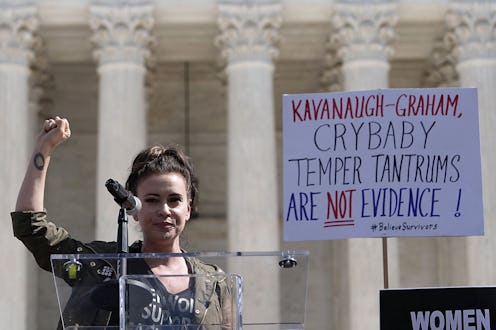News
How Alyssa Milano Thinks The Equal Rights Amendment Could've Helped Christine Ford

Roughly a year after she revived Tarana Burke's #MeToo movement with a viral tweet, actress and activist Alyssa Milano is still working to combat sexual violence and abuse. After Christine Blasey Ford testified about her sexual assault allegation against Brett Kavanaugh — an allegation that Kavanaugh denied — Milano argued that women are currently treated like "second-class citizens" under the law. In an interview with USA Today, Milano said the Equal Rights Amendment would help Ford and other survivors because it would enshrine gender equality in the Constitution.
“When we are not in the Constitution for any protections except for the right to vote, I think that it allows for a perspective of ‘lesser than,’” Milano told USA Today. “It will just put women on an equal footing in the legal system, particularly in areas where women have historically been treated like second-class citizens, especially in cases of domestic violence and sexual assault.”
Over the past several decades, 37 states have ratified the Equal Rights Amendment, which aims to guarantee equal protection for women in the Constitution. If one more state ratifies the amendment, The New York Times reported, organizers would likely lobby Congress to recognize that the amendment had achieved the minimum number of ratifications despite technically missing the 1982 deadline.
According to Milano, passing an Equal Rights Amendment would be a productive way to move forward.
“I will say that it is time that sexual assault victims that come forward to have the complete legal support of our Supreme Court,” Milano told USA Today. “Maybe the most important thing that we can do post the #MeToo era … is give women equal rights under our Constitution.”
Milano attended the Kavanaugh-Ford hearing to support Ford. She was joined by New York Rep. Carolyn Maloney and California Rep. Jackie Speier, both of whom have been advocating for the passage of the Equal Rights Amendment. Following Ford's emotional testimony, Milano penned an op-ed for Variety in which she compared Kavanaugh's confirmation process to the Anita Hill hearings in the 1990s. Like Kavanaugh, Clarence Thomas was ultimately confirmed to the Supreme Court after denying sexual misconduct accusations against him. The similarity prompted Milano to acknowledge that while progress has been made, a lot still needs to change.
“I think about how a panel of white men questioned Anita Hill about her sexual past and how despicably she was treated by politicians of both parties,” Milano wrote. “I think about how far we’ve come in many regards. And at the same time, and in the same breath, I lament how much farther we have yet to go.”
In Milano's view, the Equal Rights Amendment would help the country advance in terms of women's rights, and improve how survivors of sexual violence are treated. Although it is not clear, as The Hill pointed out, how the text of the Equal Rights Amendment would have applied to Ford's allegation, Milano appeared to suggest that the amendment would systemically provide equal footing for women, including survivors who come forward with their stories — as many did in recent weeks, compelled by Ford's testimony.